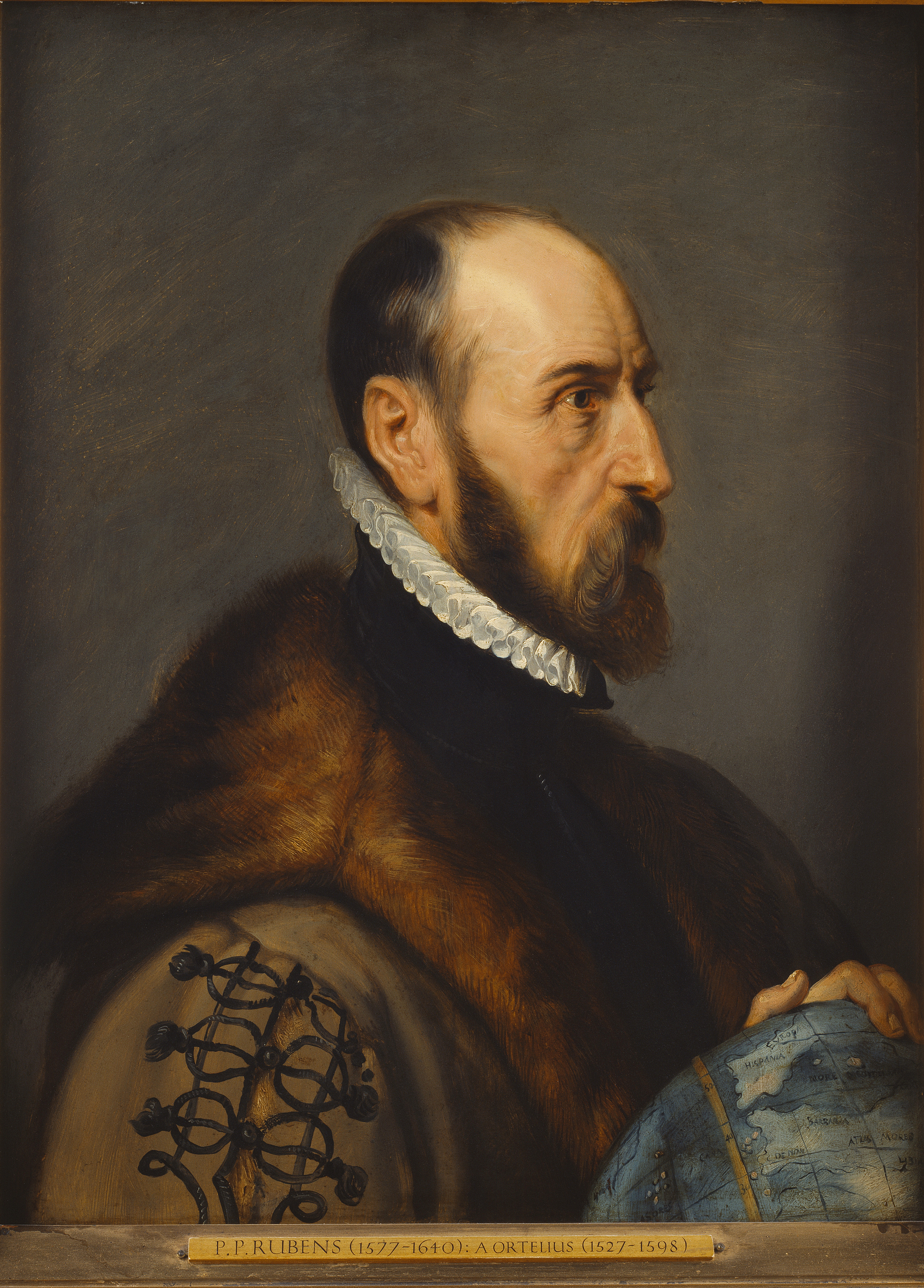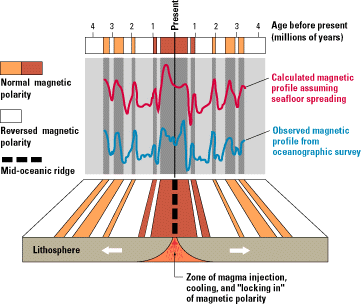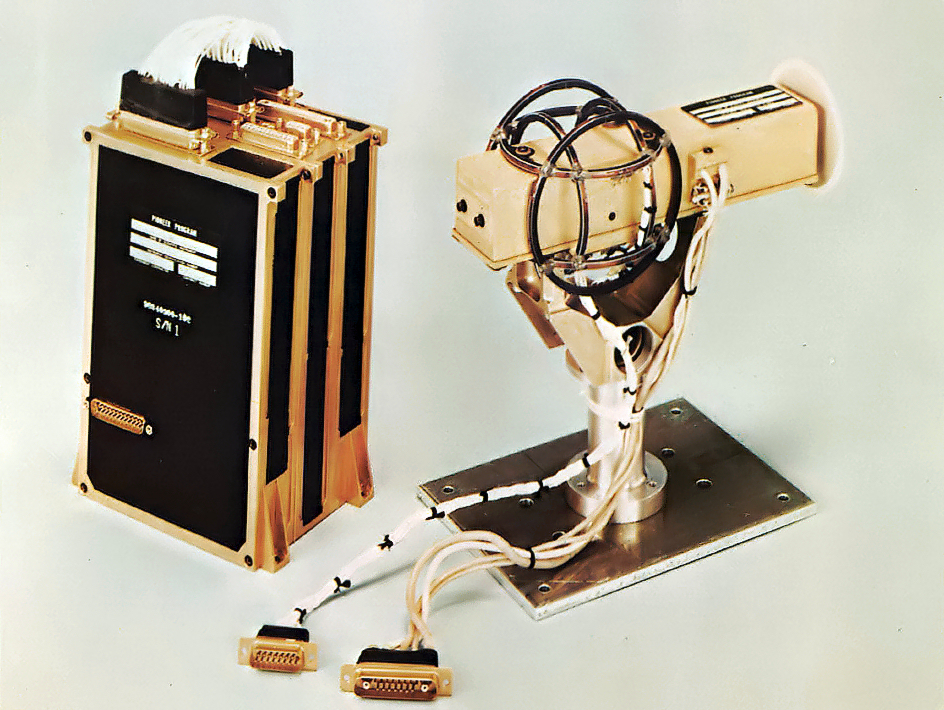|
Magnetic Polarity Reversal
A geomagnetic reversal is a change in a planet's magnetic field such that the positions of magnetic north and magnetic south are interchanged (not to be confused with geographic north and geographic south). The Earth's field has alternated between periods of ''normal'' polarity, in which the predominant direction of the field was the same as the present direction, and ''reverse'' polarity, in which it was the opposite. These periods are called '' chrons''. Reversal occurrences are statistically random. There have been at least 183 reversals over the last 83 million years (on average once every ~450,000 years). The latest, the Brunhes–Matuyama reversal, occurred 780,000 years ago, with widely varying estimates of how quickly it happened. Other sources estimate that the time that it takes for a reversal to complete is on average around 7,000 years for the four most recent reversals. Clement (2004) suggests that this duration is dependent on latitude, with shorter durations at ... [...More Info...] [...Related Items...] OR: [Wikipedia] [Google] [Baidu] |
Geomagnetic Polarity Late Cenozoic
Earth's magnetic field, also known as the geomagnetic field, is the magnetic field that extends from Earth's interior out into space, where it interacts with the solar wind, a stream of charged particles emanating from the Sun. The magnetic field is generated by electric currents due to the motion of convection currents of a mixture of molten iron and nickel in Earth's outer core: these convection currents are caused by heat escaping from the core, a natural process called a geodynamo. The magnitude of Earth's magnetic field at its surface ranges from . As an approximation, it is represented by a field of a magnetic dipole currently tilted at an angle of about 11° with respect to Earth's rotational axis, as if there were an enormous bar magnet placed at that angle through the center of Earth. The North geomagnetic pole actually represents the South pole of Earth's magnetic field, and conversely the South geomagnetic pole corresponds to the north pole of Earth's magnetic fiel ... [...More Info...] [...Related Items...] OR: [Wikipedia] [Google] [Baidu] |
Continental Drift
Continental drift is the hypothesis that the Earth's continents have moved over geologic time relative to each other, thus appearing to have "drifted" across the ocean bed. The idea of continental drift has been subsumed into the science of plate tectonics, which studies the movement of the continents as they ride on plates of the Earth's lithosphere. The speculation that continents might have 'drifted' was first put forward by Abraham Ortelius in 1596. A pioneer of the modern view of mobilism was the Austrian geologist Otto Ampferer.Helmut W. Flügel: Die virtuelle Welt des Otto Ampferer und die Realität seiner Zeit'. In: Geo. Alp., Vol. 1, 2004. The concept was independently and more fully developed by Alfred Wegener in 1912, but the hypothesis was rejected by many for lack of any motive mechanism. The English geologist Arthur Holmes later proposed mantle convection for that mechanism. History Early history Abraham Ortelius , Theodor Christoph Lilienthal (1756), A ... [...More Info...] [...Related Items...] OR: [Wikipedia] [Google] [Baidu] |
Drummond Matthews
Drummond Hoyle Matthews FRS (5 February 1931 – 20 July 1997), known as "Drum", was a British marine geologist and geophysicist and a key contributor to the theory of plate tectonics. His work, along with that of fellow Briton Fred Vine and Canadian Lawrence Morley, showed how variations in the magnetic properties of rocks forming the ocean floor could be consistent with, and ultimately help confirm, Harry Hammond Hess's 1962 theory of seafloor spreading. In 1989 he was awarded the Geological Society of London's highest honour, the Wollaston Medal. Early life During World War II he went to school at The Downs in Malvern, and then Bryanston School in Dorset. He became head boy at both. Career Alfred Wegener's theory of continental drift had never gained much scientific support due to its lack of any satisfactory mechanism to drive the process. During the 1950s, however, extensive surveys of the ocean floor revealed a global, linked system of mid-ocean ridges, all of which ... [...More Info...] [...Related Items...] OR: [Wikipedia] [Google] [Baidu] |
Frederick Vine
Frederick John Vine FRS (born 17 June 1939) is an English marine geologist and geophysicist. He made key contributions to the theory of plate tectonics, helping to show that the seafloor spreads from mid-ocean ridges with a symmetrical pattern of magnetic reversals in the basalt rocks on either side. Early life Vine was born in Chiswick, London, and educated at Latymer Upper School and St John's College, Cambridge where he studied Natural Sciences (BA, 1962) and marine geophysics (PhD, 1965). He married Susan 'Sue' Vine (née McCall), who worked as a research assistant for Drummond Matthews in the Department of Geodesy and Geophysics, University of Cambridge, contributing to the development of the sea-floor spreading hypothesis associated with Matthews and her husband. Plate Tectonics Vine's PhD thesis was on 'Magnetism in the Seafloor' and supervised by Drummond Matthews. Having met Harry Hess he was aware of sea floor spreading, where the ocean bed acts as a 'conveyor belt ... [...More Info...] [...Related Items...] OR: [Wikipedia] [Google] [Baidu] |
Oceanic
Oceanic may refer to: *Of or relating to the ocean *Of or relating to Oceania **Oceanic climate **Oceanic languages **Oceanic person or people, also called "Pacific Islander(s)" Places * Oceanic, British Columbia, a settlement on Smith Island, British Columbia, Canada *Oceanic, New Jersey, an unincorporated community within Rumson Borough, Monmouth County, New Jersey, United States Ships named Oceanic * , the White Star Line's first ocean liner * , a transatlantic ocean liner built for the White Star Line * , a project of the 1930s * , built as SS ''Independence'' in 1950 * , also named ''Big Red Boat I'' by Premier Cruises Art, entertainment, and media Fictional entities * Oceanic Airlines or Oceanic Airways, often used in disaster movies * Oceanic Flight 815, a flight in the television series ''Lost'' Literature * "Oceanic" (novella), a 1998 sci-fi novella by Greg Egan Music ;Artists * Oceanic (band), a 1990s UK dance/house act ;Albums * ''Oceanic'' (Isis album) * ''Oce ... [...More Info...] [...Related Items...] OR: [Wikipedia] [Google] [Baidu] |
Magnetometer
A magnetometer is a device that measures magnetic field or magnetic dipole moment. Different types of magnetometers measure the direction, strength, or relative change of a magnetic field at a particular location. A compass is one such device, one that measures the direction of an ambient magnetic field, in this case, the Earth's magnetic field. Other magnetometers measure the magnetic dipole moment of a magnetic material such as a ferromagnet, for example by recording the effect of this magnetic dipole on the induced current in a coil. The first magnetometer capable of measuring the absolute magnetic intensity at a point in space was invented by Carl Friedrich Gauss in 1833 and notable developments in the 19th century included the Hall effect, which is still widely used. Magnetometers are widely used for measuring the Earth's magnetic field, in geophysical surveys, to detect magnetic anomalies of various types, and to determine the dipole moment of magnetic materials. In an air ... [...More Info...] [...Related Items...] OR: [Wikipedia] [Google] [Baidu] |
Lamont–Doherty Earth Observatory
The Lamont–Doherty Earth Observatory (LDEO) is the scientific research center of the Columbia Climate School, and a unit of The Earth Institute at Columbia University. It focuses on climate and earth sciences and is located on a 189-acre (64 ha) campus in Palisades, New York, north of Manhattan on the Hudson River. History The Lamont–Doherty Earth Observatory (LDEO) was established in 1949 as the Lamont Geological Observatory on the weekend estate of Thomas W. and Florence Haskell Corliss Lamont, which was donated to the university for that purpose. The Observatory's founder and first director was Maurice "Doc" Ewing, a seismologist who is credited with advancing efforts to study the solid Earth, particularly in areas related to using sound waves to image rock and sediments beneath the ocean floor. He was also the first to collect sediment core samples from the bottom of the ocean, a common practice today that helps scientists study changes in the planet's climate and th ... [...More Info...] [...Related Items...] OR: [Wikipedia] [Google] [Baidu] |
Neil D
Neil is a masculine name of Gaelic and Irish origin. The name is an anglicisation of the Irish ''Niall'' which is of disputed derivation. The Irish name may be derived from words meaning "cloud", "passionate", "victory", "honour" or "champion".. As a surname, Neil is traced back to Niall of the Nine Hostages who was an Irish king and eponymous ancestor of the Uí Néill and MacNeil kindred. Most authorities cite the meaning of Neil in the context of a surname as meaning "champion". Origins The Gaelic name was adopted by the Vikings and taken to Iceland as ''Njáll'' (see Nigel). From Iceland it went via Norway, Denmark, and Normandy to England. The name also entered Northern England and Yorkshire directly from Ireland, and from Norwegian settlers. ''Neal'' or ''Neall'' is the Middle English form of ''Nigel''. As a first name, during the Middle Ages, the Gaelic name of Irish origins was popular in Ireland and later Scotland. During the 20th century ''Neil'' began to be used in En ... [...More Info...] [...Related Items...] OR: [Wikipedia] [Google] [Baidu] |
Australian National University
The Australian National University (ANU) is a public research university located in Canberra, the capital of Australia. Its main campus in Acton encompasses seven teaching and research colleges, in addition to several national academies and institutes. ANU is regarded as one of the world's leading universities, and is ranked as the number one university in Australia and the Southern Hemisphere by the 2022 QS World University Rankings and second in Australia in the ''Times Higher Education'' rankings. Compared to other universities in the world, it is ranked 27th by the 2022 QS World University Rankings, and equal 54th by the 2022 ''Times Higher Education''. In 2021, ANU is ranked 20th (1st in Australia) by the Global Employability University Ranking and Survey (GEURS). Established in 1946, ANU is the only university to have been created by the Parliament of Australia. It traces its origins to Canberra University College, which was established in 1929 and was integrated into ... [...More Info...] [...Related Items...] OR: [Wikipedia] [Google] [Baidu] |
Ian McDougall (geologist)
Ian McDougall (24 May 1935 – 10 November 2018) was an Australian geologist and geochemist. McDougall was born in Hobart and studied at the University of Tasmania and Australian National University The Australian National University (ANU) is a public research university located in Canberra, the capital of Australia. Its main campus in Acton encompasses seven teaching and research colleges, in addition to several national academies and ..., before taking up a research position at ANU. He was a Fellow of the Geological Society of America, the Australian Academy of Science, and the American Geophysical Union. McDougall also served as Vice President of the International Association of Volcanology and Chemistry of the Earth's Interior. McDougall's research areas included plate tectonics and geochronology. He has been described as "one of Australia's most internationally distinguished earth scientists," and was awarded the Centenary Medal in 2001. McDougall died on 10 Novemb ... [...More Info...] [...Related Items...] OR: [Wikipedia] [Google] [Baidu] |
Brent Dalrymple
G. Brent Dalrymple (born May 9, 1937) is an American geologist, author of ''The Age of the Earth'' and ''Ancient Earth, Ancient Skies'', and National Medal of Science winner. He was born in Alhambra, California. After receiving a Ph.D. from University of California, Berkeley, Dalrymple went to work at the U.S. Geological Survey (USGS) in Menlo Park, California. In 1994 he left the USGS to accept a position at Oregon State University, where he served on the faculty until retiring in 2001. He is a member of the National Academy of Sciences. In 2003, Dalrymple was awarded the National Medal of Science. He was presented with the Medal at a ceremony in 2005. Since 2013, Dalrymple has been listed on the Advisory Council of the National Center for Science Education The National Center for Science Education (NCSE) is a not-for-profit membership organization in the United States whose stated mission is to educate the press and the public on the scientific and educational aspects of con ... [...More Info...] [...Related Items...] OR: [Wikipedia] [Google] [Baidu] |
United States Geological Survey
The United States Geological Survey (USGS), formerly simply known as the Geological Survey, is a scientific agency of the United States government. The scientists of the USGS study the landscape of the United States, its natural resources, and the natural hazards that threaten it. The organization's work spans the disciplines of biology, geography, geology, and hydrology. The USGS is a fact-finding research organization with no regulatory responsibility. The agency was founded on March 3, 1879. The USGS is a bureau of the United States Department of the Interior; it is that department's sole scientific agency. The USGS employs approximately 8,670 people and is headquartered in Reston, Virginia. The USGS also has major offices near Lakewood, Colorado, at the Denver Federal Center, and Menlo Park, California. The current motto of the USGS, in use since August 1997, is "science for a changing world". The agency's previous slogan, adopted on the occasion of its hundredt ... [...More Info...] [...Related Items...] OR: [Wikipedia] [Google] [Baidu] |







